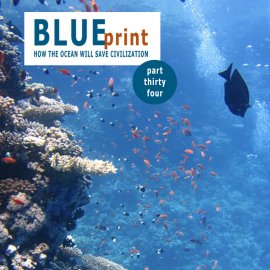The Ocean Genome, part 2
-
English
-
ListenPause
[intro music] Welcome to World Ocean Radio… I’m Peter Neill, Director of the World Ocean Observatory. We are discussing the ocean genome, that is, the full catalogue of chemical and biological information contained in the DNA of all ocean species and floating free in the ocean water column. For this edition, I am relying on an article from Nature Sustainability, an academic journal, that describes in fulsome detail research and implication resulting from species study and description, genetic sampling coastwise and in the deep sea, the potential commercial benefits, and prospects for future conservation and equity. In last week’s edition, I discussed the reality of commercial interests already invested in ocean genetics in the context of oil and gas exploration, seafloor mining, port enhancement, and fisheries and aquaculture. But there are many other applications and opportunities that suggest the ocean as a very different asset base with a variety of new applications such as marine drug discovery, nutraceuticals and cosmeceuticals, innovative aquaculture and new food products, and other innovations yet to be discovered. The medical applications are already in train, with measurable advantage for individual patients and public health. Investigation of some 34,000 marine bio-active compounds, mostly from marine invertebrates and shallow tropical reefs, has resulted in eight clinically approved drugs, with another 28 in clinical trials and 250 under preclinical investigation, “a remarkable success rate” compared to development from terrestrial products. Five of the 8 approved drugs are for the treatment of cancer, the others for neuropathic pain. This is real progress, understood by the patients already receiving the benefit of a new treatment. We are familiar with the benefits of omega-3 fatty acids, derived today commercially from fish oil, but now replaced by alternative algal oils reducing the extreme pressure on fish stocks. Diverse species collected from the Caribbean and hydro-thermal vents have also been developed as skin creams with purported anti-inflammatory and detoxifying agents. Bandages derived from fish skin have been used to treat serious burns with remarkable success. These are just the beginning of new bioactive compounds such as vitamins, carbohydrates, proteins, and peptides sourced from the ocean to add to the medical toolkit for new, more effective treatment of serious illness. In last week’s edition, I also mentioned transgenic salmon, a product of genetic combination from Pacific Chinook to Atlantic salmon, that as decreased the growth period of these farmed fish, increased size, and lowered cost. This example signifies many other modifications to come, in aquaculture and the development of other food products, an outcome that will be seriously challenged if we do not take adequate steps to protect the basic ocean environment that sustains them as elements for future public benefit. To that end, there is an international movement to create marine protected areas as a legislated discipline to protect the extraordinary potential of the ocean. Over 400 such designated areas exist, some large, many small and located in near-shore areas, particularly coral reefs, 8% of the total ocean area, only 2.5%, however, considered highly protected. The ocean preservation community is investing enormous energy and finance in these areas: growing them, regulating them, and researching new ones. The climate-directed focus of 30% of the earth reserved for conservation and climate mitigation by 2030 is the campaign of the moment. Ironically, much of this enthusiasm is directed toward land-based resources, a far lesser percentage to the ocean. As a result, many of these marine areas remain vulnerable to limited enforcement by third world nations where many of them exist, indifference by industrial fishing to restricted access and harvest, other conflicting interests, and almost no financial or management capacity to uphold the protection purpose. Some, in fact, are “paper parks,” declarations of wishful thinking. And then, there is the even great prospect for the high seas, outside the limits of national jurisdiction, where it is open season on resource extraction of rare metals, bulk chemicals, radical seaweed harvest, genetic material, and more. If there is profit in the ecological diversity and biometrics of this vast area, then regardless of best intention, you can bet human activity is already evident, and the future of this global ecosystem value will be compromised by unethical acceptability, unsustainable practice, and questionable societal outcomes by agents of the most industrialized nations, profiteering, polluting, and depleting ocean resources without restraint. In the past, the ocean was simply a surface that consumption and colonialization passed over; now it is the epicenter for application of similar values, the land exhausted, and an entire new oceanic world, with all its biodiversity and benefit, revealed. We will discuss these issues, and more, in future edition of World Ocean Radio. [outro music]
This week on World Ocean Radio: part thirty-four of the multi-part BLUEprint series. This week, as part of our focus on new approaches and ideas to simplify our strategies for living sustainably on earth, we are continuing our discussion of the ocean genome as well as the commercial interests, applications and marine drug and health discoveries made and yet to be discovered. We also warn that marine protected areas remain vulnerable to limited enforcement and over-exploitation of their natural resources.

The "BLUEprint Series: How the Ocean Will Save Civilization" outlines a new and sustainable path forward, with the ocean leading the way.
About World Ocean Radio
Since 2009, a weekly 5-minute podcast covering a broad spectrum of ocean issues from science and education to advocacy and exemplary projects. World Ocean Radio, a project of the World Ocean Observatory, is available for syndicated use at no cost by college and community radio stations worldwide. Contact director@thew2o.net if you are interested in becoming an affiliate or know of a radio station that should be broadcasting these episodes each week.
- Login to post comments



